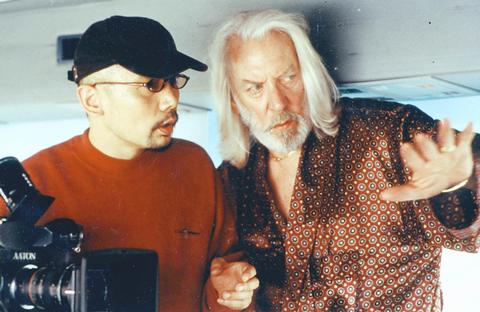For those who are interested in East-meets-West stories, this is one of the more amusing films of the year. But following on the success of Oscar-winner Crouching Tiger, Hidden Dragon (
In this contemporary comedy, Donald Sutherland plays world-famous director Don Tyler who has always been fond of Chinese culture. In the fantastic Forbidden City of Beijing, Tyler is surrounded by hundreds of costumed extras, trying to make a mega-budget re-make of The Last Emperor. He suffers such a creative block on the film set that he hardly knows where to place the camera.
Yo Yo is a cynical Chinese cameraman with who was hired by Asian-born, Western-educated Lucy, Tyler's personal assistant, to shoot footage for Tyler. Yo's unlikely friendship with Tyler helps relieve the depression Tyler feels over his creative block, but not for long. Tyler falls in a coma and his last wish is that Yo Yo throw him a wacky "comedy funeral."

PHOTO COURTESY OF BUENA VISTA
The story takes a rollercoaster ride through satire and absurdity as Yo Yo turns to best friend King, who has grand business ambitions but poor taste, to help him organize the funeral. As King intends to make the funeral a world-wide televised extravaganza, the costs become uncontrollable and the only thing Yo Yo and King can do is open bids to place advertisements in the funeral. An Italian brand of furniture supplies the bed for Tyler to lay on and Cozy Cola, Obituary Bird and other of Tyler's "close friends" take part as well. But in the midst of the unbridled craze for commercial placement, Tyler wakes up.
Director Feng excels at satirizing two things, the stereotyped Chinese fantasy and the entrepreneurial zeal which has begun sweeping through China. To make these two aspects work, Feng uses non-stop jokes and self-mockery during the advertising auction, focusing on China's rampant piracy problem and the mixed feelings towards Asian Americans. Ge You and Ying Da do a good job at making the most of these jokes.
Ying Da represents the upstart businessman with nothing but self-boasting and tackiness. And Ge You represents the jobless Beijing dweller suddenly disoriented by the wave of Westernization.
Strictly speaking, the plot transitions are not quite coherent and the ending is too predictable. But this hasn't stopped Big Shot's Funeral from becoming the best-selling local-made film ever in China, with box office receipts over 35 million renminbi (US$4.2 million), a number any Taiwanese director would envy.
Whether or not the film can cross over to Western audiences remains to be seen. Although the script has a Western context and there is the huge talent of Donald Sutherland, many of the jokes are delivered in Mandarin. The Mandarin voice and expressions of the actors are part of the comedy, making it is hard for non-Chinese viewers to appreciate. Some of the jokes are even based on Chinese word play and cannot be translated. The film's foreign distributors have their work cut out for them.

In the March 9 edition of the Taipei Times a piece by Ninon Godefroy ran with the headine “The quiet, gentle rhythm of Taiwan.” It started with the line “Taiwan is a small, humble place. There is no Eiffel Tower, no pyramids — no singular attraction that draws the world’s attention.” I laughed out loud at that. This was out of no disrespect for the author or the piece, which made some interesting analogies and good points about how both Din Tai Fung’s and Taiwan Semiconductor Manufacturing Co’s (TSMC, 台積電) meticulous attention to detail and quality are not quite up to

April 21 to April 27 Hsieh Er’s (謝娥) political fortunes were rising fast after she got out of jail and joined the Chinese Nationalist Party (KMT) in December 1945. Not only did she hold key positions in various committees, she was elected the only woman on the Taipei City Council and headed to Nanjing in 1946 as the sole Taiwanese female representative to the National Constituent Assembly. With the support of first lady Soong May-ling (宋美齡), she started the Taipei Women’s Association and Taiwan Provincial Women’s Association, where she

Chinese Nationalist Party (KMT) Chairman Eric Chu (朱立倫) hatched a bold plan to charge forward and seize the initiative when he held a protest in front of the Taipei City Prosecutors’ Office. Though risky, because illegal, its success would help tackle at least six problems facing both himself and the KMT. What he did not see coming was Taipei Mayor Chiang Wan-an (將萬安) tripping him up out of the gate. In spite of Chu being the most consequential and successful KMT chairman since the early 2010s — arguably saving the party from financial ruin and restoring its electoral viability —

It is one of the more remarkable facts of Taiwan history that it was never occupied or claimed by any of the numerous kingdoms of southern China — Han or otherwise — that lay just across the water from it. None of their brilliant ministers ever discovered that Taiwan was a “core interest” of the state whose annexation was “inevitable.” As Paul Kua notes in an excellent monograph laying out how the Portuguese gave Taiwan the name “Formosa,” the first Europeans to express an interest in occupying Taiwan were the Spanish. Tonio Andrade in his seminal work, How Taiwan Became Chinese,